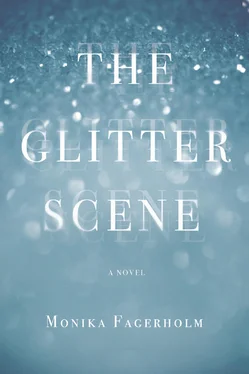Maj-Gun, who hears, sees, says nothing. But she puts her arm around Susette: it is heavy, such a weight that holds on to Susette, almost like a vise. But in it there is, completely genuine: such tenderness, leniency, such comfort—
Later, Susette will remember that conversation with Maj-Gun Maalamaa in the home that day she returned, as clear as a bell, despite so much else being forgotten, also consciously, so obscure.
Maj-Gun, whom she has not seen since childhood, whom she quite literally does not know at all. Except for “Pastor’s Crown Princess,” a few scenes from the cemetery that are buried in her from a distant childhood, and so, naturally, what you managed to see of Maj-Gun in the rectory in her role as the sister of your first love Tom Maalamaa whom you went out with for six–seven months when you were about fourteen years old. Though, in and of itself, you did not see a lot of Maj-Gun, in the rectory, either. She was not home very much but mainly it was that she and Tom Maalamaa spent most of their time behind the closed door in Tom’s room. And listened to music: classical music, Gustav Mahler’s Ninth Symphony, always “Mahler’s Ninth.”
A fantastic reconciliation with mankind’s existential conditions, a feeling of life so closely connected to a simultaneous consciousness of death . As Tom Maalamaa used to say, almost solemnly, sometimes.
•
What she said, what Maj-Gun said in response. Because those have, so to speak, been the last sensible sentences for a long time. She has not really been able to explain why either. But also because a few months later when that time in the house with Maj-Gun has passed, has been over, it has been something she knowingly and wittingly preferred not to think about after the fact.
The house is sold after these two months, Maj-Gun forced to vacate her attic study on the second floor and move away. And Susette bought a small apartment with her inheritance from her mother and father, which was divided in three among her and her brothers. A studio on the first floor in a row of apartment buildings on the fields on the north side of the town center.
And she started working for Businesswoman of the Year Jeanette Lindström again: actually gone looking for Jeanette Lindström on her own after a period of idleness when the money started drying up and more or less begged for a job, any job whatsoever. “I’ll see what I can do for you,” Jeanette Lindström had said. Jeanette whom Susette had worked for one summer once long ago, as a teenager after almost a year at the private nursing home in the District for the elderly and infirm. A few days in Jeanette Lindström’s two-window Ice Cream Stand on the square in the town center, then the strawberry fields.
And a few years later Jeanette Lindström had added, stupidly jokingly so to speak but with some sort of warning in it: “But this time we’ll let the strawberry fields go, right? Who knows where the butterfly might flutter off to this time and we don’t want to be party to a flight like that again. Not to mention it gets costly and difficult for the employer to find a replacement on such short notice.”
Where the butterfly might flutter off to this time . That is how she spoke, Jeanette Lindström, in other words like an allusion, that it was from those miserable strawberry fields up north where Susette had been sent as extra labor from the ice cream stand at the square where she really should have been working that summer three years ago that Susette ran away with a “Pole,” Janos, whom she had met there, while working.
He was the one who had wanted to get away from there: he had not been happy or grateful in the least about this means of getting a visa to travel to a country outside the so-called Iron Curtain and then under controlled means, like a member of an official friendly exchange between the two countries, earn a little bit of money (actually no money, that is how it was for everyone at the strawberry fields, and Businesswoman of the Year was not exactly someone who drove up the wages).
Janos—her second love, dull and intense. And besides, he was not from Poland but Lithuania but everyone said Poland so it just stayed like that.
“Well, this time I was thinking of a real job that you can live on,” Susette had replied, deathly serious, but now in this situation almost four years later, Jeanette Lindström has not grasped the sore spot rather let it go and actually offered Susette a job with a decent wage in her legitimate business activities, which found itself in an expansion stage at this point in time. And so it turned out that during the years that followed, Susette worked for her on different projects: shop assistant in the Little Gift Shop, assistant in catering and so on, up until the point that as a result of an argument she had with her employer, she quit her job and started cleaning for Solveig Torpeson in her cleaning business Four Mops and a Dustpan.
“With these words I’m transferring things to you, Susette,” on Solveig’s wedding day no less. Jeanette Lindström had pushed Susette Packlén in her server’s apron up to the bride in a puffed-sleeved wedding dress at the bride’s table after Susette, in a hurry and because Jeanette Lindström had been in the way the whole time, managed to drop a few plates from the fellowship hall’s white bone china set on the floor so that they had broken. These words have become legendary, because afterward no one remembers what “these words” were, and in and of themselves, they were unintelligible because by that point Jeanette had pinched some of the wedding cognac. Of course, these types of stories were loved in the District.
•
But, as said, there was a time right before, before Jeanette Lindström, before Solveig, before everything: a short period lasting just a few months which, while it lasted, was still as long as an eternity, perpetuum mobile . At home in the house with Maj-Gun Maalamaa. Just her and Maj-Gun who becomes Majjunn again during that time. From the cemetery, the gate, tjii this way tjii that way. “Say Pastor’s Crown Princess…” That Majjunn. A sound from a childhood, a name that has glued itself to your tongue.
Majjunn sitting on a kitchen chair in the house with Susette’s mother’s old sewing scissors. Cutting old clothes into rags. Long, skinny strips whirling down into a bucket at her feet. At their feet: because Susette has also been sitting there, on another kitchen chair, in her pajamas and she also had a pair of scissors in her hand.
Crehp crehp the scissors fly through the fabric, rags, clothes. Majjunn’s scissors, and her own. Majjunn talking, humming.
Silk velvet rag scraps yes I have seen the most I have—
That song, which becomes Majjunn’s song, like a strange refrain in a silence that when Majjunn does not speak, a humming envelops them in the empty house.
And the sound of the scissors, as said. Crehp crehp . How they flew through the fabric.
But then later it passed so to speak and when it was over—yes, why should you, why should Susette think about it then?
Life has gone on. And besides, it has at least been clear: these thoughts, feelings, they do not get her anywhere.
•
But this she remembers, despite the fact that so much else from that time becomes forgotten afterward: that the last thing she and Maj-Gun do together during that time in the house after her mother’s death is go to the movies. Sitting perfectly positioned in the best seats in an otherwise empty movie theater. Maj-Gun ordered the tickets for them over the phone a few days in advance so they would be sure to get a seat. It is, Maj-Gun has been sure to explain, a very popular young adult film they are going to see. “A real young adult movie for young adults like us,” she explains. “I got the best seats!”
Читать дальше











